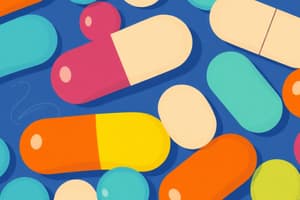Podcast
Questions and Answers
A patient with a history of substance abuse is prescribed a benzodiazepine for anxiety. Which potential adverse effect should the nurse prioritize monitoring for, given the patient's history?
A patient with a history of substance abuse is prescribed a benzodiazepine for anxiety. Which potential adverse effect should the nurse prioritize monitoring for, given the patient's history?
- Severe muscle spasms
- Increased risk of suicidal ideation (correct)
- Sudden onset of hypertension
- Development of hyperglycemia
A patient taking lithium for bipolar disorder is started on a low-sodium diet to manage hypertension. Which of the following potential complications should the nurse monitor for?
A patient taking lithium for bipolar disorder is started on a low-sodium diet to manage hypertension. Which of the following potential complications should the nurse monitor for?
- Reduced effectiveness of antihypertensive medications
- Elevated blood pressure, counteracting the effects of the low-sodium diet
- Increased risk of lithium toxicity due to altered sodium and water balance (correct)
- Decreased lithium levels, leading to loss of therapeutic effect
A patient is prescribed an antipsychotic medication. What is the most important teaching point the nurse should emphasize regarding the expected time frame for therapeutic effects?
A patient is prescribed an antipsychotic medication. What is the most important teaching point the nurse should emphasize regarding the expected time frame for therapeutic effects?
- It may take several weeks of consistent use to experience the full therapeutic benefits. (correct)
- Noticeable improvement in thought processes is typically observed within 24 hours.
- The medication will provide immediate relief of symptoms upon the first dose.
- The medication should only be taken on an as-needed basis for acute symptoms.
A patient taking an SSRI, a tricyclic antidepressant, and tryptophan concurrently presents with restlessness, myoclonus, and a fever. Which condition is the most likely cause of these symptoms?
A patient taking an SSRI, a tricyclic antidepressant, and tryptophan concurrently presents with restlessness, myoclonus, and a fever. Which condition is the most likely cause of these symptoms?
A patient is prescribed valproic acid (Depakote) for mood stabilization. What baseline laboratory test is most important for the nurse to review before initiating therapy?
A patient is prescribed valproic acid (Depakote) for mood stabilization. What baseline laboratory test is most important for the nurse to review before initiating therapy?
A client recently started taking an SSRI. How long should the nurse advise the client it may take to start feeling the therapeutic effects of the medication?
A client recently started taking an SSRI. How long should the nurse advise the client it may take to start feeling the therapeutic effects of the medication?
A young adult is prescribed an SSRI for depression. What is the most critical adverse effect the nurse should monitor for during the initial weeks of treatment?
A young adult is prescribed an SSRI for depression. What is the most critical adverse effect the nurse should monitor for during the initial weeks of treatment?
A client taking an MAOI is instructed to avoid foods high in tyramine. Which meal option would be considered safe for this client?
A client taking an MAOI is instructed to avoid foods high in tyramine. Which meal option would be considered safe for this client?
A client is prescribed a tricyclic antidepressant (TCA). Which pre-existing condition should the nurse identify as a contraindication to receiving this medication?
A client is prescribed a tricyclic antidepressant (TCA). Which pre-existing condition should the nurse identify as a contraindication to receiving this medication?
A client taking an SNRI reports experiencing side effects. Which of the following aligns with the common side effects associated with SNRIs?
A client taking an SNRI reports experiencing side effects. Which of the following aligns with the common side effects associated with SNRIs?
A client is prescribed an 'atypical' antidepressant. What potential adverse effect should the nurse prioritize when educating the patient about this medication?
A client is prescribed an 'atypical' antidepressant. What potential adverse effect should the nurse prioritize when educating the patient about this medication?
A client who has been taking an MAOI for 2 weeks reports no improvement in their depressive symptoms. What is the nurse's best course of action?
A client who has been taking an MAOI for 2 weeks reports no improvement in their depressive symptoms. What is the nurse's best course of action?
A client is exhibiting signs of serotonin syndrome shortly after starting antidepressant treatment. Which cluster of symptoms is most indicative of this condition?
A client is exhibiting signs of serotonin syndrome shortly after starting antidepressant treatment. Which cluster of symptoms is most indicative of this condition?
Flashcards
Anti-Anxiety Medications
Anti-Anxiety Medications
Medications used for anxiety and related depression, including benzodiazepines and barbiturates.
Anticonvulsants (AED) as Mood Stabilizers
Anticonvulsants (AED) as Mood Stabilizers
Drugs used to treat withdrawal symptoms, anxiety disorders, bipolar disorder, and schizophrenia, affecting mood and GABA levels.
Lithium
Lithium
A mood stabilizer used to treat mania, bipolar disorder, and other mental health conditions; it alters sodium transport in nerve cells.
Antipsychotics/Neuroleptic Agents
Antipsychotics/Neuroleptic Agents
Signup and view all the flashcards
Serotonin Syndrome
Serotonin Syndrome
Signup and view all the flashcards
SSRIs
SSRIs
Signup and view all the flashcards
SNRIs
SNRIs
Signup and view all the flashcards
Atypical Antidepressants
Atypical Antidepressants
Signup and view all the flashcards
Tricyclic Antidepressants (TCAs)
Tricyclic Antidepressants (TCAs)
Signup and view all the flashcards
MAOIs
MAOIs
Signup and view all the flashcards
Tyramine-rich foods
Tyramine-rich foods
Signup and view all the flashcards
Metabolic Syndrome
Metabolic Syndrome
Signup and view all the flashcards
Study Notes
- Antidepressants are a class of medications used to treat depression.
SSRIs: Serotonin Selective Reuptake Inhibitors
- The medications are the first line of treatment for depression
- They inhibit the reuptake of serotonin in the brain
- The effects of the medication take 1-3 weeks to appear
- There is a black box warning for increased suicidal ideation and behaviors in children, teens, and young adults
- Serotonin syndrome can occur 2-72 hours after starting treatment
- Monitor for changes in weight, dry mouth, GI upset, flu-like symptoms, dizziness, and headache
SNRIs: Serotonin (5HT) & Norepinephrine (NE) Reuptake Inhibitors
- These medications decrease the reuptake of norepinephrine and serotonin
- Side effects are similar to SSRIs, including elevated blood pressure, nausea and vomiting, dry mouth, constipation, dizziness, and suicidal ideation
Atypical Antidepressants
- They do not fit into other antidepressant categories and are considered second-generation antidepressants
- Used to treat depression, psychotic disorders, and anxiety disorders
- Medications affect serotonin and dopamine levels
- Side effects include weight gain, increased cholesterol, and diabetes (metabolic syndrome)
Tricyclics (TCAs)
- Block the presynaptic reuptake of 5HT and NE, increasing effects at the receptors
- Avoid use in patients with urinary retention or closed-angle glaucoma
- It takes 2-4 weeks for effects to appear
- Monitor for anticholinergic effects like dryness and constipation
MAOIs: Monoamine Oxidase Inhibitors
- Block MAOI enzymes, increasing norepinephrine, dopamine, 5HT, and tyramine levels
- These medications are not the first line of treatment and are very restrictive
- It takes 2-4 weeks for effect (can take up to 12 weeks)
- Nardil (phenelzine) and Parnate (tranylcypromine) are examples of MAOI medications
Foods Containing Tyramine (MAOIs)
- Foods containing tyramine MUST be avoided
- Fermented or pickled foods
- Cured meats (smoked and processed)
- Alcohol beverages (red wines and liqueurs)
- Aged cheeses (Swiss, parmesan, provolone, brie)
- Tofu, beans, pineapples, plums, raspberries, nuts, and raisins
- Sauerkraut
- Soy sauce
- MSG
- Moderate tyramine consumption should only be occasional
- Chocolate
- Yogurt and sour cream
- Avocados and bananas
- Gouda, processed American, and mozzarella cheeses
- White wine, coffee, colas, and hot chocolate
- Low tyramine consumption is permissible through
- Figs, pasteurized cheeses (cream cheese, cottage cheese, and ricotta)
- Distilled spirits
Pharm Cont. Anti-anxiety & Benzos
- Used to treat anxiety and anxiety-related depression
- These medications can come from various drug classes: benzos and barbiturates
- Monitor for CNS effects
- Side effects include hangover-type effects
- Used to treat anxiety, insomnia, delirium, seizures, tension, tremors, muscle spasms, and used to sedate
- Acts on the limbic, thalamic, and hypothalamic systems, causing relaxation effects
- It can cause drowsiness and sedation
- Avoid these medications during pregnancy
- HRF suicidal ideation is possible, particularly with a history of substance abuse
Anticonvulsants (AED) & Mood Stabilizer
- AEDs are used to treat withdrawal syndromes, anxiety disorders, dementia, bipolar disorder, and schizophrenia
- Medications affect mood
- Has CNS effects
- Medications affect GABA
- Valproic acid (Depakote) and carbamazepine (Tegretol) are examples of these medications
Lithium
- Lithium is a mood stabilizer, used to treat mania, bipolar disorder, major depression, schizoaffective disorder, schizophrenia, eating disorders, phobias, ADHD, and PTSD
- Exact action is unknown; is a salt, alters NA transport to muscle and nerve cells
- Narrow therapeutic window
- Maintain steady fluid and electrolyte balance (sodium and water)
- Medication is contraindicated in pregnancy
Antipsychotics/Neuroleptic Agents
- Block dopamine receptors
- Treat disorders of impaired thought processes
- Helps to organize thoughts
- Therapeutic effects appear after several weeks
- Crosses placenta and breast milk
- Divided into two categories: typical and atypical
Serotonin Syndrome
- A toxic state caused by an increase in brain serotonin activity
Symptoms of Serotonin Syndrome
- Neuromuscular symptoms include: restlessness, myoclonus (uncontrollable jerking movements), tremor and rigidity, hyperreflexia
- Other symptoms include: shivering/elevated temperature, arrhythmias, etc.
- Serotonin Syndrome can be fatal due to cardiac collapse
- Causes can include combined or consecutive treatment with SSRIs, tricyclics, MAOIs, tryptophan, etc.
- Stop drugs - usually resolves in no more than 24 hours, symptomatic measures (i.e., cooling, BDZs)
- Prevention can come from taking care when combining or switching serotonergic antidepressants
Neuroleptic Malignant Syndrome
- A potentially life-threatening reaction to antipsychotic drugs
- Cause: after taking drug for first time or abrupt discontinuation of antipsychotic medications
Presentation of Neuroleptic Malignant Syndrome
- Muscle rigidity, hyperthermia, vital sign instability (increased/decreased BP and tachycardia), diaphoresis, elevated creatine kinase
- Nursing interventions: immediately stop taking medication, monitor fluid and electrolytes, cooling methods (ice packs, cool blankets), administer fever reducer, place on cardiac monitoring, provider may order muscle relaxer
Studying That Suits You
Use AI to generate personalized quizzes and flashcards to suit your learning preferences.




